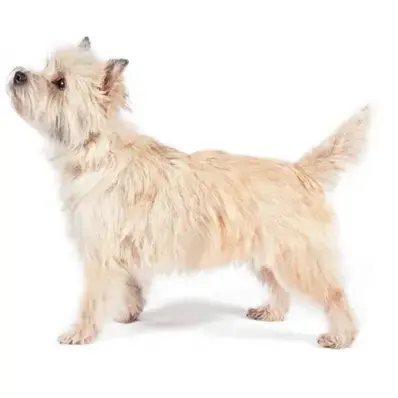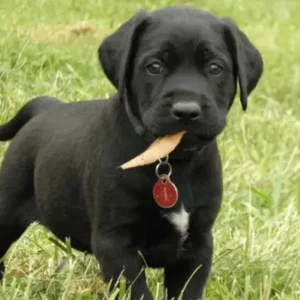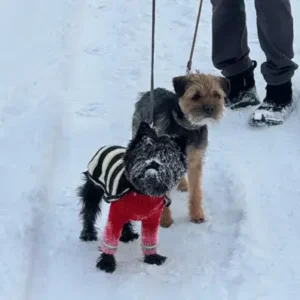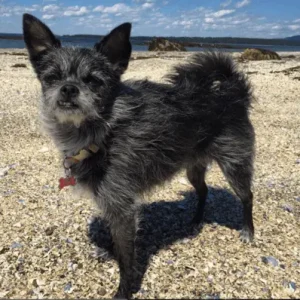Cairn Terrier History/Origin
The Cairn Terrier is one of several terrier breeds, some still existing and others extinct, that patrolled Scotland’s farms and game preserves for centuries. Their histories are challenging to trace, as they were long grouped under the term “Scotch terriers.”
It wasn’t until the late 1800s that breeding programs and classifications for these hardy exterminators were established. The term “Cairn Terrier” first appeared in print in 1887, though the breed had been around since at least the 1600s, particularly in Scotland’s Western Highlands and on the Isle of Skye, home to the Skye Terrier.
In Scotland, a “cairn” referred to a pile of stones marking boundaries or graves. Rodents often lived within these cairns, and the Cairn Terrier, one of the smallest ground terriers, was bred to dig into these rock piles and route out vermin.
These courageous, independent dogs also worked in packs to hunt foxes, otters, and other predators. Their toughness and alertness made them adept at confronting sharp-toothed prey in tight spaces.
Cairn Terrier History- Source: AKC.org
By the early 20th century, terrier enthusiasts in Britain had defined distinct breeds such as Cairn, Scottish, Skye, and West Highland White Terriers. The Cairn Terrier was recognized by the AKC under Terrier Group in 1913.
Cairn Terrier Physical Appearance
The Cairn Terrier is small but full of personality. It has a small, well-proportioned head with a strong muzzle. Its hazel eyes sit under shaggy eyebrows, and the small, erect ears are set apart. The black nose is small, and the long neck allows for proper head carriage. The body is medium-length with strong, muscular thighs and well-sprung ribs.
- Size
These purebred dogs typically stands between 9.5 to 10 inches tall, making it a compact and agile breed. It weighs around 13 to 14 pounds, striking a balance between being small enough for easy handling and sturdy enough to be active and playful.
This size allows the Cairn Terrier to be versatile, whether in a home or outdoors while maintaining its energetic and spunky nature.
- Coat color
The Cairn Terrier has a scruffy, rugged appearance. It features a double coat with a wiry outer coat and a soft undercoat. The coat comes in a variety of colors, including red, brindle, black, sand, and gray. This combination of coats gives the Cairn Terrier its distinctive look.
Cairn Terrier Gender Differences
When it comes to Cairn Terriers, there are very few differences between males and females. Males are generally slightly larger than females, but the difference is so minor that it’s hard to notice at first glance.
On average, females stand about 1 inch shorter and weigh around 1 pound less than males. While this difference exists, it’s so small that it’s almost negligible. Males are technically a bit larger and heavier than females, but the distinction is minimal.
Cairn Terrier Feed/Nutrition
An adult Cairn Terrier should be fed 1/2 to 1 cup of high-quality dry food daily, split into two meals. The amount your dog eats depends on factors like size, age, build, metabolism, and activity level. Just like people, dogs have individual needs, so a more active dog will require more food than a less active one.
The quality of the food matters too—premium food provides better nutrition, meaning you’ll need to feed your dog less. Adding fruits like watermelon can also be a healthy treat, but make sure it’s given in moderation.
To keep your Cairn Terrier in good shape, measure their food and stick to a regular feeding schedule instead of leaving food out all day.
Cairn Terrier Health Issues
Cairn Terriers are generally healthy, but like all breeds, they can be prone to certain health issues. Not every Cairn will develop these conditions, but it’s important to be aware of them if you’re considering this breed. If you’re purchasing a puppy, ensure you choose a reputable breeder who can provide health clearances for the puppy’s parents.
- Cataracts: Cairn Terriers can develop cataracts, a condition where the lens of the eye becomes cloudy, impairing vision. This can lead to blindness if untreated. To prevent cataracts or manage them early, regular eye exams and a healthy diet rich in antioxidants can help reduce the risk.
- Liver Shunt: Liver shunt in Cairn Terriers can cause symptoms such as vomiting, loss of appetite, and lethargy. To help prevent this condition, ensure your dog has a well-balanced diet, avoid feeding harmful substances like chocolate or alcohol, and schedule regular vet checkups for early diagnosis and management.
- Coagulopathy: Coagulopathy refers to a blood clotting disorder where a Cairn Terrier may have difficulty stopping bleeding. This can result from inherited conditions or liver disease. Regular blood tests and avoiding trauma or injuries can help monitor this condition and prevent complications.
- Cushing’s Disease: Cushing’s disease occurs when the adrenal glands produce excess cortisol, leading to symptoms like excessive thirst, urination, and weight gain. To manage or prevent this condition, avoid obesity, maintain a consistent exercise routine, and monitor your dog’s hormone levels with regular vet visits.
- Hip Dysplasia: Hip dysplasia is a genetic condition where the hip joint doesn’t develop properly, leading to pain and difficulty walking. Preventive measures include controlling your dog’s weight to avoid excess strain on the joints, providing joint supplements, and ensuring they get proper exercise.
- Tooth Pathology: Cairn Terriers are susceptible to dental issues such as tartar buildup, gum disease, and tooth decay. Regular tooth brushing, dental checkups, and chew toys can help prevent tooth problems and maintain good oral hygiene.
- Knee Problems: Knee problems, such as patellar luxation (dislocated kneecaps), can affect Cairn Terriers, causing limping and pain. Keeping your dog at a healthy weight and avoiding high-impact activities can help reduce the risk of knee issues.
- Pyruvate Kinase Deficiency: It is a hereditary condition that affects red blood cell function, leading to anemia in Cairn Terriers. Although there is no cure, managing the condition with a balanced diet and regular blood work can help maintain overall health and prevent complications
Cairn Terrier Care and Grooming
Caring for a Cairn Terrier is relatively simple. Due to his small size, he’s well-suited for apartment living but is hardy enough for ranch life. However, he still needs sufficient exercise to stay healthy and alert. A long daily walk or vigorous play for 20 to 30 minutes will do the trick.
Although he learns quickly, the Cairn Terrier can also be stubborn. Regular obedience training starting with puppy classes is key to teaching him good manners and respect for your authority. Be prepared for him to challenge you, but with positive, kind, and consistent training, he will respond well.
Teaching a “quiet” command is essential. Do not allow him off-leash in public areas as he may be tempted to chase. Also, don’t leave him unsupervised in the yard — he loves to dig, whether it’s near the fence or in your flower garden.
His coat is easy to groom with a weekly brushing and occasional bathing (every three months or as needed). Frequent bathing should be avoided because it softens the coat. Some trimming is required to maintain a neat look, but it’s not necessary for a family pet. If he’s a show dog, stripping is done, but for pets, a trim with clippers two to three times a year is enough.
Brush his teeth at least two to three times a week to prevent tartar buildup, and trim his nails once or twice a month. Check his ears weekly for signs of infection, and wipe them with a cotton ball and pH-balanced ear cleaner. Never insert anything into the ear canal.
Start grooming him as a puppy. Handle his paws, look inside his mouth, and make grooming a positive experience. This will make future exams and vet visits easier. During grooming, also look for signs of sores, rashes, or infections on his skin, nose, mouth, eyes, and feet. His eyes should be clear, without redness or discharge.
This regular grooming will help you catch potential health problems early. Additionally, training your dog to sit during grooming can help make the process smoother and more comfortable for both of you.
Cairn Terrier Rescue Groups
f you’re considering adopting a Cairn Terrier, look for a Cairn Terrier rescue organization. Many loving dogs need a forever home, and rescues can help match you with the right pet. Adopting a Cairn Terrier rescue is a rewarding experience and gives a dog a second chance at happiness.
Cairn Terrier Price
The price of a Cairn Terrier typically ranges from $1,200 to $2,000, depending on factors such as breeder reputation, pedigree, and location.
If you’re looking for a Cairn Terrier puppy for sale, make sure to choose a reputable breeder who follows responsible breeding practices. It’s important to ask for health clearances and ensure that the puppies have been raised in a loving, well-socialized environment.
Interesting Facts
- The most famous Cairn Terrier played Toto, of all time was a movie star, best known for playing the mischievous canine sidekick in The Wizard of Oz.
Toto- Source: Wikipedia
- The term “cairn” refers to a pile of stones, either naturally formed or arranged by humans, commonly used as road markers or memorials.
- Dustin Hoffman has owned a Cairn Terrier as a pet.
Dustin Hoffman with his pet- Source: Cairn Talk
- Cairn Terrier has been featured in the Dog Breed Judging Show 2024.
Best For
The Cairn Terrier is best suited for individuals or families who can provide consistent exercise and enjoy an active, playful companion. They thrive in homes where they are given attention, mental stimulation, and regular playtime. Due to their independent yet affectionate nature, they’re a great fit for owners who can balance training with positive reinforcement.
Top Names
| Male Cairn Terrier Names | Female Cairn Terrier Names |
| Max | Bella |
| Charlie | Daisy |
| Toby | Rosie |
| Rocky | Molly |
| Winston | Lucy |









 Cairn Terrier History- Source:
Cairn Terrier History- Source: 
 Black Cairn Terrier – Source:
Black Cairn Terrier – Source:  Fawn Cairn Terrier – Source:
Fawn Cairn Terrier – Source:  Brindle Cairn Terrier – Source:
Brindle Cairn Terrier – Source:  White Cairn Terrier – Source:
White Cairn Terrier – Source: 
 Toto- Source:
Toto- Source:  Dustin Hoffman with his pet- Source:
Dustin Hoffman with his pet- Source: 






